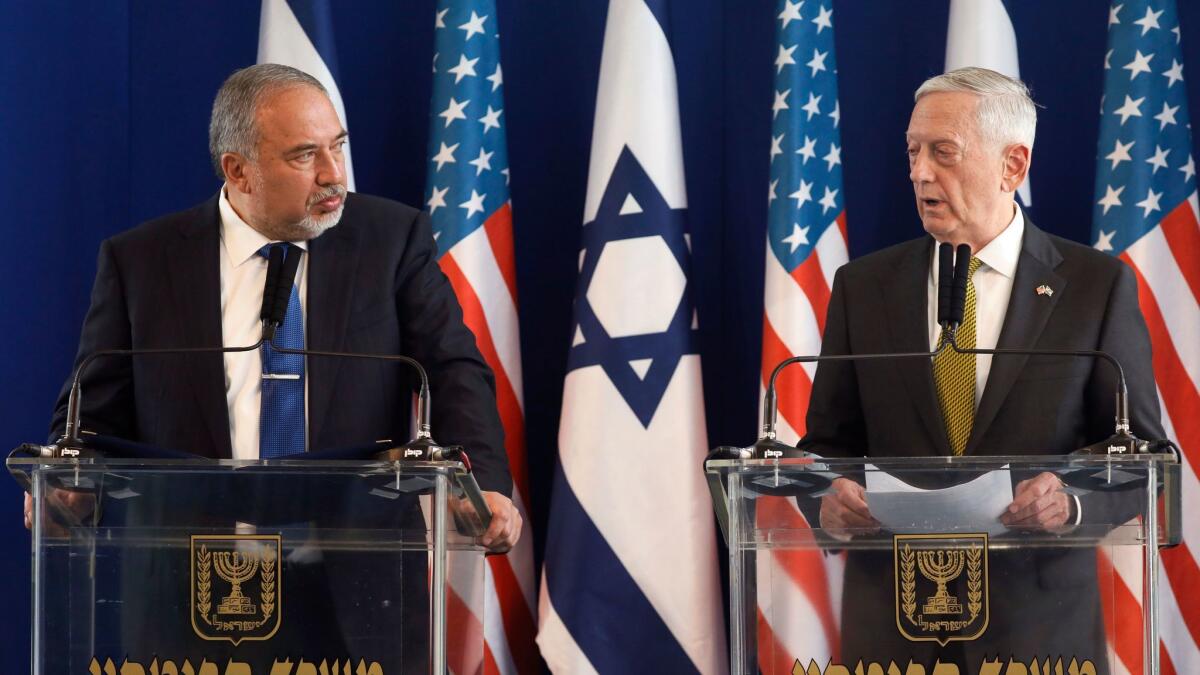Defense Secretary Mattis: ‘No doubt’ Syria still has chemical weapons

Reporting from TEL AVIV — Syria has dispersed its air force combat planes in recent days in response to the U.S. cruise missile strike two weeks ago following a chemical attack on civilians in the province of Idlib, said Defense Secretary James Mattis during a visit to Israel on Friday.
Mattis, speaking at a news conference with Israeli Defense Minister Avigdor Lieberman, also said there was “no doubt” that the Syrian government has retained stockpiles of chemical weapons in violation of a United Nations Security Council resolution from 2013 that called for their removal.
The defense secretary declined to reveal how many chemical weapons Syria has held on to, but said that the issue would have to be taken up diplomatically. An Israeli army officer told local reporters earlier this week that most of the Syrian chemical weapons stockpile was either removed or destroyed after 2013, but that Syrian President Bashar Assad held on to a residual amount.
Mattis, on a swing through the Middle East that includes stops in Egypt, Saudi Arabia and Qatar, warned that Syria would be “ill advised” to use chemical weapons in the future, saying that “we’ve made that very clear with our strike” two weeks ago. On April 7, the U.S. fired 59 Tomahawk cruise missiles in response to a Sarin gas attack, which killed scores of people.
The Defense secretary’s remarks about the dispersal of the Syrian combat aircraft came in response to a question about reports that Assad’s military had moved its planes near Russian air bases in the governorate of Latikia to protect them from a possible U.S. attack.
“They have dispersed their aircraft in recent days, no doubt,’’ Mattis told reporters Friday morning at the Israeli Defense Ministry in Tel Aviv.
The Defense secretary, the first Cabinet level official in the Trump administration to visit Israel, later held a meeting in Jerusalem with Prime Minister Benjamin Netanyahu, who reiterated praise for the U.S. cruise missile strike, calling it a sign of a “strategic change” in U.S. leadership and policy from the Obama administration.
Israeli politicians and defense experts unanimously hailed the attack earlier this month, arguing that it indicated that the Trump administration would become more deeply engaged in the region than its predecessor and that it would not hesitate to use force when necessary to defend its policy red lines.
However, it’s still unclear what changes if any the Trump administration is planning regarding U.S. policy toward Iran’s nuclear program — a source of bitter open disagreement between Israel and the Obama administration.
When asked by a reporter whether he supports changes to the U.S.-led international agreement from 2015 to limit Iran’s nuclear fuel program, the Defense secretary declined to comment except to reiterate the conclusions of a State Department report this week that Iran is honoring the agreement.
Standing alongside Lieberman, Mattis said that “we are pretty confident that they are living up to their part of the agreement… the agreement on nuclear issues still stands.” The Defense secretary said, however, that Tehran’s fulfillment of the deal did not excuse Iran’s involvement in Yemen’s civil war and its support for Assad in the Syria conflict.
After the regular criticism of Obama’s policy on Iran and on the peace process with the Palestinians, Netanyahu and other politicians in his right-wing government have largely been deferential to the Trump administration despite the mixed messages from the president and U.S. officials on policy.
Given the opportunity to comment on what Israel would like to see change in the U.S. stance toward Iran, Lieberman said that Israel welcomed a decision by the U.S. to initiate a review of Washington’s policy toward Iran, and that Israel is “not in a position to give advice.’’
“We are satisfied, and have enough patience to wait for concrete steps,’’ the defense minister said.
Mattis’ visit comes less than two weeks before Palestinian President Mahmoud Abbas is scheduled to visit Washington for a White House meeting with the president, and the defense minister also steered clear of thorny issues on the Israeli-Palestinian conflict.
When asked if he still stands by a 2013 remark that the Israel’s Jewish settlements in the West Bank could lead to apartheid, he gave a rambling and confused response.
“Whatever it takes to keep Israel secure is where we stand,’’ he said. “How Israel achieves its level of sustainable security is absolutely critical, and that includes all the peoples here inside the borders of the Middle East. All of these people are going to have to work together, we’re going to have to resolve it, and it’s got to be done in a way that looks out for the rights of all those people.’’
The U.S. has been trying to enlist Arab countries such as Egypt, Jordan and Saudi Arabia to help restart peace talks between Israel and the Palestinians. Questioned about Trump’s hesitation to make good on a promise to move the U.S. Embassy from Tel Aviv to Jerusalem, Mattis declined to comment and referred reporters to the State Department.
Mitnick is a special correspondent.
ALSO
Islamic State claims responsibility for Paris shooting that kills 1 officer and wounds 2 others
Iran is quiet, for now, in the face of fresh threats from the Trump administration
UPDATES:
8:55 a.m.: This article updated with additional details about the Syrian warplanes.
11:15 a.m.: This article updated with additional background on U.S.-Israeli relations.
This article was originally published at 5:40 a.m.
More to Read
Sign up for Essential California
The most important California stories and recommendations in your inbox every morning.
You may occasionally receive promotional content from the Los Angeles Times.










